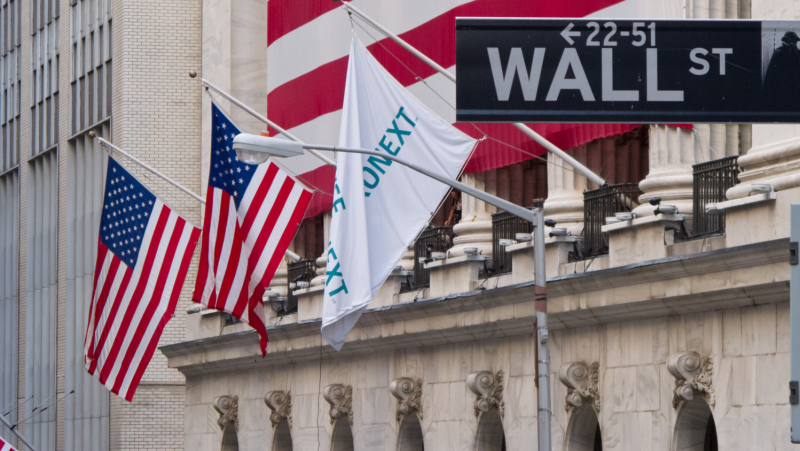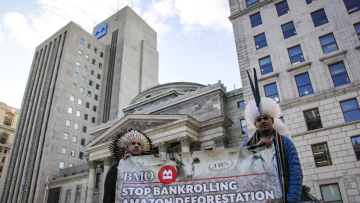Risks ahead of meatpacker JBS’ NYSE listing: “Wall Street: Steer clear of JBS”
TJ Helmstetter, tjhelmstetter@foe.org
Brittany Miller, bmiller@foe.org

TJ Helmstetter, tjhelmstetter@foe.org
Brittany Miller, bmiller@foe.org
On September 20, several leading climate, agriculture, and animal rights NGOs held a press conference in front of the New York Stock Exchange to warn the financial sector about the certain risks associated with supporting and investing in JBS, the world’s largest meatpacking company. Earlier this year, JBS announced a plan to restart its decade-long attempt to list shares on the Exchange. Participants at the event held a banner displaying the message: “Wall Street: Steer Clear of JBS // Deforestation. Land Grabs. Climate Change.”
The press conference was held in conjunction with the release of a written investor briefing, which was endorsed by sixteen NGOs, Incuding BankTrack, and distributed to known JBS investors, financiers, and other major financial institutions.
The investor briefing highlights how JBS has been repeatedly implicated in climate change, deforestation, biodiversity loss, human rights abuses, and corruption scandals, whether as a parent company or through its network of subsidiaries and suppliers.
Industrial livestock production is one of the largest sources of emissions fueling climate change. Leading experts have repeatedly pointed out that we must urgently address emissions from livestock by dramatically scaling back consumption and production of animal foods and shifting to ecological agriculture practices in order to avoid climate catastrophe.
Financial institutions provide capital for industrial livestock and meat production companies, such as JBS, Tyson, and Cargill, to continue expanding their production. Bank of America and Citigroup are some of the latest financiers to underwrite JBS bonds, issued this month. BlackRock and Vanguard are some of the top investors in JBS.
“JBS has been exposed for environmental and climate destruction for years,” said Chelsea Matthews, senior campaigner for Friends Of The Earth. “U.S. commercial banks like Bank of America and Citigroup can’t credibly implement their climate commitments if they continue to provide financial support to meat giants like JBS.”
“We are here to say JBS is enabling land grabbing and attacks on Indigenous people but also the destruction of the planet,” said Ana Paula Vargas, Brazil program director at Amazon Watch. “So we need to tell Wall Street and Citigroup and Bank of America that this company is enabling and being complicit in the destruction. We have to stop financing JBS if you don’t want to be a part of the problem.”
“Too often we see US-based banks and corporations implicated in rainforest destruction,” said Ashley Thomson, senior policy advisor for Global Witness. “JBS poses a risk to the world’s tropical forests and to human rights. With no real government action to stem the flow of deforestation, we are appealing directly to investors to urge them to consider the full scope of risks by investing in JBS.”
“Wall Street is enabling a company that relies on stolen land, forced labor, bribery and environmental destruction to turn a profit,” said Steph Dowlen, forests and finance campaigner for Rainforest Action Network. “To avoid locking in another decade of climate chaos, forest destruction and human rights abuses, Citigroup and Bank of America must put their money where their mouth is by steering clear of JBS.”
“Investing in the health of our planet and all animals who share it is no longer niche or optional, it is an imperative,” said Annette Manusevich, farming campaign manager for World Animal Protection. “JBS cannot be allowed to continue misleading the public and investors.”
Photos and videos from the event are available here.
Background information:
Earlier this year, JBS announced a plan to restart its decade-long attempt to list shares on the New York Stock Exchange (NYSE) via a dual listing under a new Dutch parent company (“JBS N.V.”). JBS’s last attempt to execute an initial public offering (IPO) in the US in 2017 was undermined by the company’s role in “the largest corruption inquiry in history,” which resulted in a record-breaking $3.2 billion fine to settle five separate investigations into JBS’s business practices.
JBS company leadership has said it expects the dual listing to be complete by December 2023; however, the transaction must be approved by the SEC, Brazilian regulators, and shareholders.
Last month, Rainforest Action Network petitioned the SEC to open an investigation into JBS and urged it to scrutinize the dual listing. Last year, an audit by Brazilian prosecutors found significant “irregularities” in JBS’s beef sourcing – indicating concerns that JBS is contributing to illegal deforestation in the Amazon rainforest. Earlier this summer, the U.S. Senate Finance Committee hosted a hearing investigating cattle supply chains and deforestation in the Amazon, with Senators zeroing in on JBS’s practice of “cattle laundering”.

